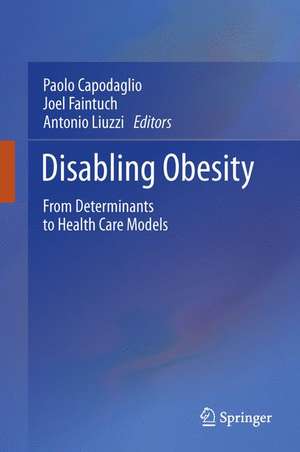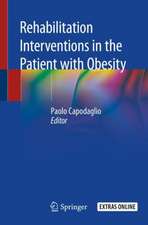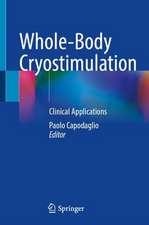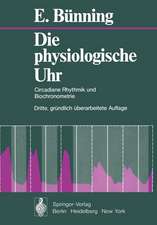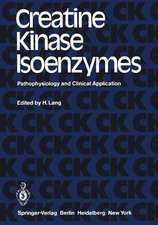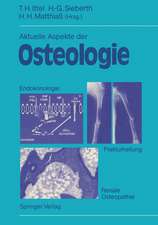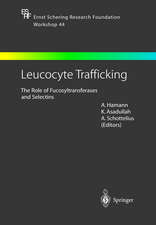Disabling Obesity: From Determinants to Health Care Models
Editat de Paolo Capodaglio, Joel Faintuch, Antonio Liuzzien Limba Engleză Hardback – 17 apr 2013
| Toate formatele și edițiile | Preț | Express |
|---|---|---|
| Paperback (1) | 779.73 lei 6-8 săpt. | |
| Springer Berlin, Heidelberg – 20 mai 2015 | 779.73 lei 6-8 săpt. | |
| Hardback (1) | 1102.31 lei 6-8 săpt. | |
| Springer Berlin, Heidelberg – 17 apr 2013 | 1102.31 lei 6-8 săpt. |
Preț: 1102.31 lei
Preț vechi: 1160.32 lei
-5% Nou
Puncte Express: 1653
Preț estimativ în valută:
210.95€ • 218.90$ • 176.32£
210.95€ • 218.90$ • 176.32£
Carte tipărită la comandă
Livrare economică 17-31 martie
Preluare comenzi: 021 569.72.76
Specificații
ISBN-13: 9783642359712
ISBN-10: 364235971X
Pagini: 304
Ilustrații: VIII, 304 p.
Dimensiuni: 155 x 235 x 25 mm
Greutate: 0.62 kg
Ediția:2013
Editura: Springer Berlin, Heidelberg
Colecția Springer
Locul publicării:Berlin, Heidelberg, Germany
ISBN-10: 364235971X
Pagini: 304
Ilustrații: VIII, 304 p.
Dimensiuni: 155 x 235 x 25 mm
Greutate: 0.62 kg
Ediția:2013
Editura: Springer Berlin, Heidelberg
Colecția Springer
Locul publicării:Berlin, Heidelberg, Germany
Public țintă
Professional/practitionerCuprins
An Up-To-Date Vision on the Aetiology and on the Epidemiology of Obesity and Morbid Obesity.- Physiological Bases of Physical Limitations During Exercise.- Biomechanics of Basic Activities.- The Obesity-Related Disability.- Critical Aspects in Nursing.- Effectiveness of Multidisciplinary Inpatient and Outpatient Rehabilitation on Functional Outcomes in Obese Patients with Orthopaedic Comorbidities.- Cardiac Rehabilitation.- Work Capacity, Sleep Apnoea and Respiratory Rehabilitation.- Psychological Aspects and Rehabilitation Protocols Psychiatric Aspects.- Principles and Protocols in Nutritional Rehabilitation.- Bariatric Surgery: Current Techniques and Results.- Disability in the Post-Obese Bariatric Patient: Old and New Problems.- Aesthetic Rehabilitation after Bariatric Surgery.- New Technologies for Improving the Psychological Treatment.- Chronic Care Models for Obesity Management.
Notă biografică
Paolo Capodaglio received his M.D. degree from the University of Pavia, Italy, in 1988 and his specialization in Physical Medicine and Rehabilitation (PMR) from the same University in 1991. After graduating, he started working as a PMR specialist in an Institute for clinical care and research (Fondazione Maugeri IRCCS) with clinical and research interests. At present, he is Director of the PMR Department and the Laboratory for Research in Biomechanics and Rehabilitation at the Istituto Auxologico Italiano IRCCS in Verbania-Piancavallo, Italy and contract professor of PMR in the Medical School of the University of Brescia, Italy. He devoted most of his research to the functional evaluation in ageing and pathological conditions: spinal cord injuries, musculoskeletal disorders, and, most recently, obesity. He is reviewer for several indexed papers and author of 6 volumes and around 150 publications in the field of rehabilitation.
Dr. Joel Faintuch is Associate Professor of Surgery, São Paulo University Medical School, Head of the Nutrology Residency Program, Hospital das Clinicas, Sao Paulo, and Editor-in-Chief, Brazilian Journal of Clinical Nutrition. He has been active for a long time in the field of nutritional problems, in the first years focusing malnutrition and artificial feeding. More recently Dr. Faintuch became involved with obesity and bariatric surgery. He was Executive Director of the Brazilian Society of Bariatric and Metabolic Surgery (1999-2002) and is currently Associated Editor, Obesity Surgery (USA). Dr. Faintuch is a former International Guest Scholar, American College of Surgeons, USA and Honorary Member of three international societies (SBNPE, FELANPE and SBCBM).
Antonio Liuzzi M.D., Professor of Endocrinology at the University of Milan. Specialized in Internal Medicine. Director of the Division of Internal Medicine and of the Research Laboratory of Diabetology, Scientific Institute AuzologicoItaliano.
Through 1996 his research focused on the pathophysiology of pituitary adenomas, substantially contributing to the development of the medical treatment of these tumors. Since then, his research interests have shifted to obesity and in particular the endocrinological and functional properties of the different compartments of the adipose tissue. He is the author of numerous papers published in peer-reviewed Journals and of chapters in international books on endocrinology, and has served as an invited speaker at several international Congresses. He is a member of the Editorial Board of Journal of Endocrinological Investigation.
Dr. Joel Faintuch is Associate Professor of Surgery, São Paulo University Medical School, Head of the Nutrology Residency Program, Hospital das Clinicas, Sao Paulo, and Editor-in-Chief, Brazilian Journal of Clinical Nutrition. He has been active for a long time in the field of nutritional problems, in the first years focusing malnutrition and artificial feeding. More recently Dr. Faintuch became involved with obesity and bariatric surgery. He was Executive Director of the Brazilian Society of Bariatric and Metabolic Surgery (1999-2002) and is currently Associated Editor, Obesity Surgery (USA). Dr. Faintuch is a former International Guest Scholar, American College of Surgeons, USA and Honorary Member of three international societies (SBNPE, FELANPE and SBCBM).
Antonio Liuzzi M.D., Professor of Endocrinology at the University of Milan. Specialized in Internal Medicine. Director of the Division of Internal Medicine and of the Research Laboratory of Diabetology, Scientific Institute AuzologicoItaliano.
Through 1996 his research focused on the pathophysiology of pituitary adenomas, substantially contributing to the development of the medical treatment of these tumors. Since then, his research interests have shifted to obesity and in particular the endocrinological and functional properties of the different compartments of the adipose tissue. He is the author of numerous papers published in peer-reviewed Journals and of chapters in international books on endocrinology, and has served as an invited speaker at several international Congresses. He is a member of the Editorial Board of Journal of Endocrinological Investigation.
Textul de pe ultima copertă
Obesity is currently regarded as one of the major health challenges of the developed world. Excess body weight is an important risk factor for morbidity and mortality from cardiovascular diseases, diabetes, cancer, musculoskeletal disorders and even psychiatric problems and is estimated to cause nearly 3 million deaths per year worldwide. Obesity is not necessarily associated with comorbidities: there are indeed metabolically healthy obese individuals. Thus, we need to consider individuals presenting simple with obesity separately from those at risk of developing or who have already developed complex clinical states potentially leading to disability. Comorbidities can tip the balance of independence in patients who already have functional limitations mainly due to the excess of mass itself or who develop conditions such as diabetes, cardiovascular conditions, non-alcoholic fatty liver disease, where an abnormal metabolism of adipose tissue prevails. Morbid obesity with comorbidities leading to disability represents a real social and economic burden for National Health Systems worldwide. The presence of multiple and associated comorbidities often represents an obstacle to being admitted to hospitals for the treatment of metabolic diseases. On the other hand, clinical units with optimal standards for the treatment of pathological conditions in normal-weight patients are often structurally and technologically inadequate for the care of patients with extreme obesity. The aim of this book is to focus on the pathophysiological and rehabilitative aspects of disabling obesity, highlighting multidisciplinary rehabilitation interventions as key to counteracting the disabling aspects of complicated obesity.
Caracteristici
Provides a current vision on obesity from a rehabilitative perspective Deals with aetiology and epidemiology of obesity as well as with morbid obesity Includes genetical, physiological, biomechanical determinants, functional limitations and disability, measures of disability, occupational issues as well as rehabilitation models and programs Evidence-based discussion on effective care models and rehabilitation treatments? Includes supplementary material: sn.pub/extras
